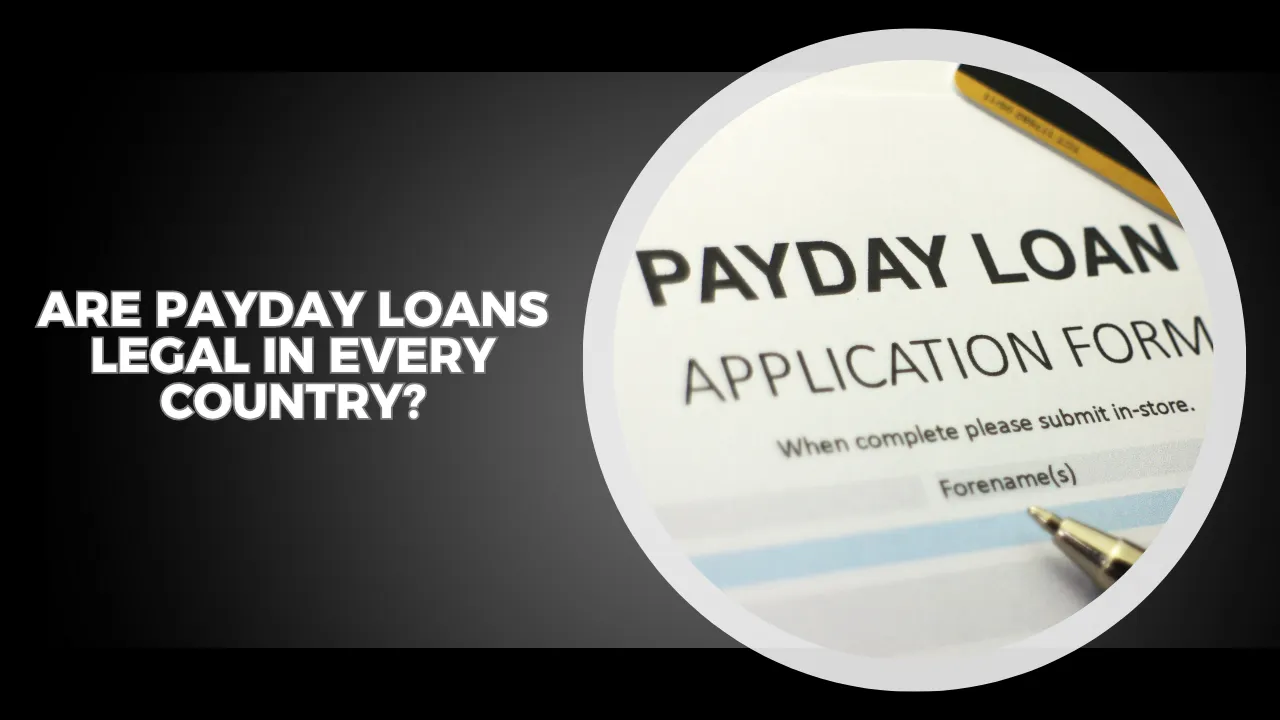Payday loans have become a controversial yet essential financial tool in many parts of the world. They’re designed to provide short-term relief for individuals facing unexpected expenses — the kind of emergency that can’t wait until the next paycheck. While some see payday loans as a lifeline, others view them as risky traps that can spiral into unmanageable debt.
But what many borrowers don’t realize is that payday lending isn’t universally accepted. In fact, the legality and regulation of payday loans vary widely from one country to another. Some governments have embraced them as part of their financial ecosystem, while others have banned them outright, labeling them as exploitative. Understanding where and why payday loans are legal — and how they’re controlled — can help borrowers make smarter financial decisions.
Understanding Payday Loans and How They Work
At their core, payday loans are small, short-term loans meant to cover urgent expenses. Borrowers typically repay them on their next payday, hence the name. The process is simple: apply online or in person, receive fast approval, and get funds within hours or days.
The appeal is obvious — accessibility and speed. Traditional bank loans can take days or weeks, require extensive documentation, and depend heavily on credit history. Payday loans, by contrast, cater to those who might not qualify for conventional credit. However, this convenience comes at a high price: interest rates can reach triple digits annually.
That’s where legal oversight becomes critical. Without regulations, lenders could impose unfair terms, leading to cycles of debt that trap borrowers financially. Countries that allow payday loans often enforce interest caps, licensing requirements, and transparency rules to protect consumers.
Payday Loan Regulations Around the World
The global stance on payday lending is incredibly diverse. In the United States, for example, regulation depends largely on state law. Some states like California and Texas permit payday loans under strict conditions, while others such as New York and Massachusetts ban them entirely. Federal law requires lenders to disclose fees and interest rates clearly, but the lack of national uniformity creates uneven consumer experiences.
In Europe, payday loans are generally legal but tightly regulated. The United Kingdom, for instance, has established a comprehensive framework to oversee lenders, protect borrowers, and cap interest rates. The UK’s Financial Conduct Authority (FCA) sets strict rules on affordability checks, marketing transparency, and maximum loan costs. Borrowers looking for payday loans uk can now find safer and more transparent options thanks to these reforms. The focus has shifted from aggressive lending to responsible financial support, which has significantly reduced borrower defaults and complaints.
Meanwhile, in Nordic countries like Sweden and Finland, payday loans remain legal but face high regulatory scrutiny. Interest rate caps, cooling-off periods, and income verification are standard. Conversely, nations such as Germany and Italy effectively discourage payday lending by enforcing rigid usury laws that make short-term high-interest lending unprofitable.
Outside Europe, approaches vary even more. Canada allows payday lending at the provincial level, setting different borrowing limits and interest ceilings across provinces. Australia legalizes payday loans under the National Consumer Credit Protection Act but restricts fees and repayment terms. On the other hand, countries like Japan and South Korea have imposed drastic interest caps — often below 20% — effectively reducing the presence of traditional payday lenders.
Why Some Countries Ban Payday Loans Entirely
While payday loans can fill urgent financial gaps, their potential for abuse has led several governments to prohibit them altogether. Nations such as India, China, and several Middle Eastern countries have outlawed or heavily restricted payday lending. Their reasons are largely the same — consumer protection and financial stability.
In unregulated markets, payday loans can easily morph into predatory schemes. Without clear limits, lenders might charge exorbitant fees, leading borrowers into cycles of debt that become impossible to break. Such practices not only harm individuals but also undermine trust in the wider financial system.
Some countries also have strong cultural or religious opposition to high-interest lending. For instance, Islamic finance principles prohibit “riba,” or interest-based profit. As a result, nations with large Muslim populations often rely on Sharia-compliant alternatives, such as profit-sharing or service-based lending models instead of conventional payday loans.
The Role of Technology and Online Lending
The rise of digital lending platforms has blurred borders when it comes to payday loans. Today, borrowers can access international lenders online, often from countries with looser regulations. While this increases accessibility, it also raises new legal and ethical challenges.
Many online payday lenders operate in “grey zones” — jurisdictions where laws are ambiguous or unenforced. They may advertise globally, but when borrowers face issues such as overcharging or data misuse, seeking recourse can be difficult. Regulators worldwide are now working to close these loopholes by improving cross-border cooperation and introducing clearer digital finance laws.
Interestingly, some fintech companies are reshaping payday lending for the better. Instead of offering high-interest loans, they’re building salary advance systems or interest-free emergency credit lines for workers. These modern alternatives could eventually replace traditional payday loans by providing speed and convenience without the same financial risks.
Balancing Accessibility with Consumer Protection
The challenge for lawmakers isn’t whether payday loans should exist — it’s how they should exist. People will always need emergency credit options, especially those living paycheck to paycheck. Banning payday loans doesn’t eliminate financial emergencies; it just pushes borrowers toward unregulated or illegal lenders.
That’s why the most effective policies focus on balance. Transparent terms, affordability checks, and fair interest limits ensure that payday loans serve their purpose without exploiting vulnerable borrowers. Countries like the UK, Canada, and Australia have demonstrated that responsible regulation can make payday loans both accessible and safe.
For borrowers, understanding local laws is crucial. Before taking out a loan, it’s worth checking whether the lender is licensed, what interest rate caps apply, and what consumer protections are in place. Borrowers in regulated markets are better protected from hidden fees and aggressive collection practices.
The Future of Payday Lending
The payday loan industry is evolving quickly. As financial technology advances, traditional lenders face pressure to modernize or reform. Governments are also paying closer attention to consumer protection, especially as inflation and cost-of-living crises push more people toward short-term borrowing.
Future payday loans may look very different from today’s versions. We could see more integration with digital banking, real-time credit scoring, and AI-driven affordability checks. Some platforms are even experimenting with blockchain-based lending for transparency. The ultimate goal is to make short-term credit faster, safer, and fairer for everyone involved.
However, one truth will remain constant: borrowers need education as much as access. Financial literacy plays a key role in ensuring payday loans are used responsibly — as tools of relief, not traps of debt.
Conclusion
Payday loans occupy a complex position in the global financial landscape. They are legal in some countries, regulated in others, and banned entirely elsewhere. What determines their acceptance isn’t just economics — it’s the balance between accessibility and protection.
For some borrowers, payday loans are a necessary bridge during tough times. For others, they’re a financial hazard. The difference often lies in the presence — or absence — of fair regulation. By understanding the laws in their country and choosing licensed, transparent lenders, borrowers can access short-term credit without jeopardizing their financial future.








